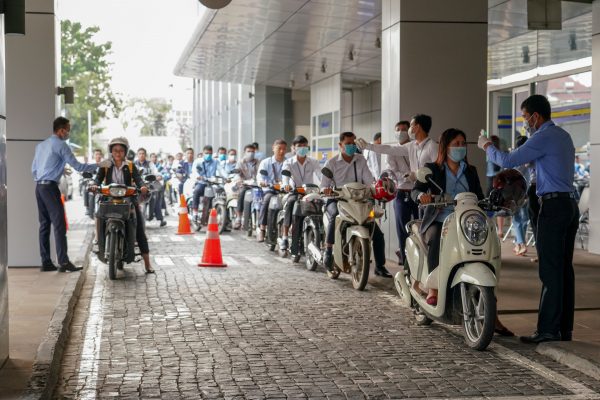It also undermined the banned Cambodian National Rescue Party’s (CNRP) strategy for reinstatement.
The government drew criticism for its initially lax approach to the impending public health crisis, but by March its response underwent a sharp turnaround. The new measures included border closures, quarantine requirements, lockdowns and an information campaign to promote hygiene awareness and behavioural change. As of 2 January, Cambodia has recorded only 379 COVID-19 cases and no deaths.
Many Cambodians have expressed pride in the ability of their low-income country to effectively weather the crisis, especially considering the devastating situation in rich nations like the United States and the United Kingdom. Unsurprisingly, the Cambodian government has been eager to highlight this distinction. The COVID-19 success story has become an important element to build on established themes and narratives of Hun Sen’s nationalist rhetoric.
His claims that Cambodia’s ruling elite is unduly at the receiving end of international criticism is undermined by the government’s use of the pandemic as an excuse to implement oppressive policies. Among them was a crackdown on so-called fake news that resulted in dozens of arrests and the rapid passing of a state of emergency law which gives the Prime Minster almost unlimited powers to strip away remaining individual freedoms. For now, the government has chosen not to put the law into effect.
Throughout 2020, human rights organisations registered numerous unprovoked attacks and crackdowns on political actors and activists, who were charged with incitement or public disturbance. Their ‘crimes’ included rapping about corruption, organising peaceful demonstrations that apparently caused traffic jams and posting jokes about mask-wearing chickens. The absurdity of the justifications for charging people put forward by the authorities underscores the government’s intention to make an example of its power.
Observers disagree over whether these increasingly overt and aggressive attacks on Hun Sen’s critics are a sign of the Cambodian ruling elite’s growing confidence or of lingering insecurities over the public’s waning support for the Cambodian People’s Party’s (CPP) decades-long rule. Regardless, the effect of these harassment campaigns on democratic freedoms and freedom of expression is devastating. In 2020, the Fundamental Freedoms Monitoring Project found that Cambodians’ self-censorship increased to the highest levels ever reported.
The Cambodian government has also weakened the opposition’s movement to reinstate the CNRP. Since the 2017 Cambodian Supreme Court decision to dissolve the CNRP, the CPP’s former main political challenger and former CNRP president, Kem Sokha, have been struggling to maintain hope in its eventual rehabilitation. Kem Sokha tries to maintain grassroot support by meeting with supporters across Cambodia’s provinces. His trial for treason — widely condemned as politically motivated — has been suspended due to COVID-19 but he remains under court-imposed restrictions. This means that the government has the power to arbitrarily return him to prison at any time.
Outside Cambodia’s borders, the international Cambodian National Rescue Movement (CNRM), led by exiled opposition leader Sam Rainsy, disintegrated into a loose network of support groups that have sprung up in various cities around the globe. In February 2020, Sam Rainsy briefly celebrated the European Union’s decision to partially suspend trade preferences that Cambodia enjoys under the Everything but Arms trade scheme due to the Cambodian government’s serious and systematic human rights violations. Yet the measure fell short in providing a turning point in the struggle for the CNRP’s reinstatement.
The movement then focussed on taking exiled CNRP figures like Sam Rainsy and former CNRP vice president Mu Sochua on a global tour to meet with democratic leaders and supporters. Images of their visits to Paris or Brussels were widely circulated on social media. Gestures of support from democratic governments and their leaders have always been highly valued in Rainsy’s bid for leadership. In the context of the exiled leaders’ desperate quest for financial and moral support, such images became much more essential. 2020 was devastating for this strategy. COVID-19 ended it all: the rallies and the crowds, the hugs and the handshakes. In the process, it social-distanced away any semblance of force by unity. Now, CNRP supporters increasingly focus on lobbying foreign governments, including Australia, to impose targeted sanctions on the Cambodian elite.
Cambodia’s green spot on the global map of COVID-19 infections stands in contrast to the bright red symbol the country has secured for declining political freedoms. With vaccination campaigns now underway globally, lockdowns and social distancing may end in 2021. Yet, severe restrictions on the Cambodian people’s fundamental rights — including political participation — will likely stay for much longer.
Katrin Travouillon is a Lecturer in the Department of Political & Social Change at the Coral Bell School of Asia Pacific Affairs, The Australian National University.
This article is part of an EAF special feature series on 2020 in review and the year ahead.


Whether people agree or disagree with Sen, he is still a strong stable leader who says what should be done. No leader in world has got it completely right, but none have achieved what Hun Sen has with limited resources he has. He has led and maintained a stable country. You can not please everybody, but as a UK citizen I feel safer here then in the UK. I think one of the problems in the west is too many right are claimed.